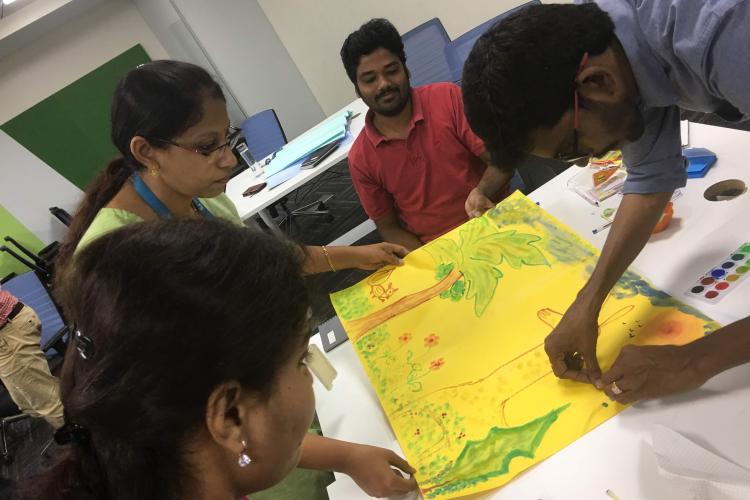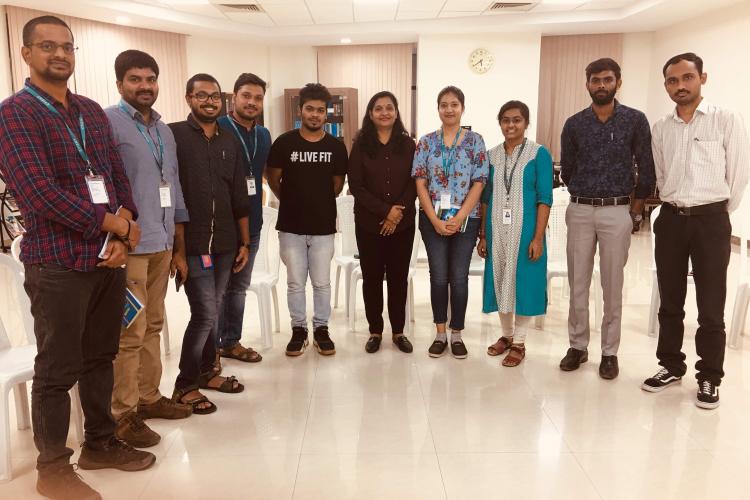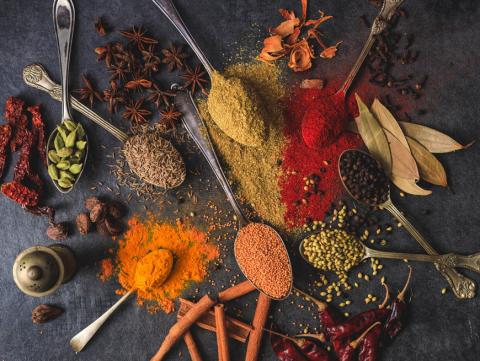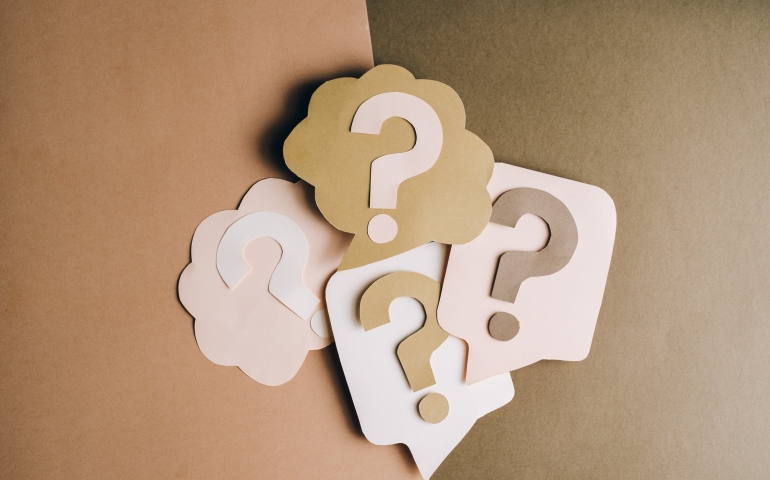10 Indian spices for a healthy living
Kitchen is the best place to look for natural remedies and also the place to start your journey to healthy living. Let’s take a deep drive into the healing properties of some ingredients readily available in your kitchen. We will discuss 10 Indian spices for healthy living
- Ajwain / Carom Seeds
- Ajwain is very useful in disturbed digestive system. It specially benefits in indigestion and flatulence. Because of its supportive role for the digestive system; Ajwain is often added to the food stuffs which are heavy to digest.
- Ajwain also has a supportive effect on liver and spleen thus helping in better secretion of the bile juices and better metabolism.
- Ajwain cleanses the reproductive organs.
- Ajwain is very useful for dental problems. Ajwain powder should be used regularly for cleansing teeth.
- Ajwain seeds are very beneficial in asthma and shortness of breath. It’s smoke can relieve respiratory distress.
- Ajwain seeds enhance libido both in males and females.
- Ajwain seeds correct the metabolism and benefit in rheumatic conditions.
- Dalchini / Cinnamon
- It is used for mouth wash in bad breath and keeps teeth healthy. This is done by chewing cinnamon.
- Chewing of Dalchini helps in nausea.
- Dalchini paste is applied in skin diseases like moles and skin tags etc.
- Dalchini is applied locally in headache and also in inflammation.
- In dental cavity, cotton wool soaked in 1-2 drops of Dalchini oil relieves pain.
- Dalchini oil relieves pain and inflammation caused due to insect bite.
- Dalchini is also used for cleaning and healing ulcers.
- Dalchini is used in nerve related issues.
- Dalchini is useful in anorexia, abdominal pain and piles.
- Dalchini is used in weakness of heart muscles and blood disorders caused due to bacterial infection.
- Dalchini is an expectorant and helps to relieve coughing.
- Dalchini is useful in amenorrhea (Irregular periods) and infertility.
- Dhania / Coriander
- Local application of Dhania seeds relieves swelling and pain. Paste of green Dhania has very good action on headaches caused by Pitta.
- Being appetizer, digestive, liver stimulant and anthelmintic, cold or hot infusion of Dhania is used in fever related thirst.
- Repeated administration of Dhania water is beneficial in distaste, emesis, anorexia, indigestion, dysentery, diarrhea, abdominal pain, piles and helminthiasis.
- Green Dhania is effective in bleeding disorders.
- Dhania is useful in cough and dyspnoea induced by Kapha.
- Dhania is useful in cough and dyspnoea induced by Kapha.
- Dhania is the best diuretic; it is effective in dysuria and retention of urine which commonly occurs in summer season.
- Thandai (cold drink) of Dhania is useful in summer.
- Dhania is beneficial in prameha/ diabetes
- Elachi / Cardamom
- The oil of Elaichi seeds is useful in the treatment of toothache.
- Elaichi is a mouth freshener and can act as deodorant for body odours.
- Elaichi seeds and oil are appetizer, digestive and laxative.
- A whole cardamom burnt in charcoal is a good carminative. It is useful in oral disorders, abdominal pain and piles. Also Antiemetic.
- Elaichi is useful in general weakness.
- Because of its expectorant property, Elaichi is used in cough, asthma and other respiratory disorders.
- Elaichi seeds are diuretic and useful in dysuria.
- Elaichi is useful in burning sensation
- Jeera / Cumin
- Jeera paste is anti-inflammatory and analgesic; hence it is applied in painful edema.
- Jeera is useful in skin diseases, in depigmentation
- Jeera decoction is used for cleansing in skin disorders. Paste also helps in piles and pain due to insect sting.
- Being palatable, appetizer, digest, carminative, analgesic astringent and anthelmintic, Jeera is used in disorders caused by disturbance in Agni like anorexia, emesis, loss of appetite, indigestion, flatulence, pain in abdomen, sprue and hemorrhoids etc.
- Hiccups are relieved by smoking cigarettes made with ghee and Jeera.
- Jeera is a stimulant and blood purifier. So it is useful in cardiac and blood disorders.
- Jeera powder along with sugar is given in renal colic, gonorrhea and calculi.
- Jeera relieves the inflammation of the uterus. It is also useful in leucorrhoea (white discharge).
- Jaggery and Jeera powder is used as a galactagogue. Jeera is used for post delivery women to improve lactation and for strength.
- Lavang / Clove
- Clove is stimulant and antimicrobial, so it is applied locally in headaches and sinusitis.
- Lavang oil is used for massage in rheumatoid arthritis, sciatica, backache and loss of libido.
- Lavang oil swab is used in dental caries and toothache and reducing dental pain.
- Being pungent and bitter, Lavang is an appetizer and digestive. It stimulates salivary glands to increase salivary secretion.
- Lavang relieves dryness of mouth, removes bad breath and cleans the oral cavity.
- Lavang is a liver stimulant. It is useful in anorexia, loss of appetite and flatulence.
- Lavang benefits in abdominal colic, hyperacidity, nausea, thirst and liver disorders.
- In cholera, hot infusion is given to reduce vomiting, restlessness and thirst in a dose of 10-20 ml.
- Lavang stimulates heart and circulation and increases blood pressure.
- Lavang is used in cardiac debility, blood disorders and syphilis.
- Lavang reduces cough, foul smell and breathlessness, stimulates respiratory mucosa causing expectoration.
- Lavang is diuretic, so useful in dysuria.
- Lavang is aphrodisiac, galactagogue and purifies breast milk, in morning sickness Clove + honey is useful orally.
- Lavang is useful in many skin disorders by its stimulating action on skin.
- Saunf / Fennel
- Saunf is analgesic, relieves swelling, hence it is used in pain in abdomen, flatulence, hemiplegia and rheumatic diseases.
- Saunf decoction is used for fomentation on swelling and painful areas. Leaves ground in a paste are used for local application on swelling
- Saunf leaves boiled in oil are good for poultice.
- Saunf improves taste, it is an appetite stimulant and digestive.
- Saunf is also laxative and vermicide.
- Saunf is used in anorexia, emesis, loss of appetite, indigestion, flatulence, pain in abdomen and worms.
- Saunf extract is used in children for abdominal pain.
- Saunf is a cardiac stimulant and alleviates swelling, hence useful in cardiac debility and swelling.
- Being an expectorant, Saunf is used in cough, dyspnoea and hiccough.
- Being diuretic, Saunf benefits a lot in dysuria.
- Saunf is Emmenagogue i.e. an herb which stimulates blood flow in the pelvic area and uterus. This property makes Saunf very useful in amenorrhea (irregular menses). Saunf also benefits from vaginal pain.
- Saunf is galactagogue i.e. a herb which nourishes the mammary gland and improves lactation. So it is recommended in conditions of low milk secretion.
- Snuthi / Dry Ginger
- Shunthi is used as a local application in swollen joints and rheumatoid arthritis.
- Shunthi is the best medicine for all Vata disorders/ any kind of pain disorder. It stimulates nerves, improves impulse transmission and relieves pain.
- Shunthi is an excellent appetizer, anti satiety, digestive, antiflatulent, antihaemorrhoidal and antispasmodic. So, Shunthi is used in anorexia, nausea, vomiting, loss of appetite, indigestion, flatulence, abdominal pain, jaundice and piles.
- In oedema, Shunthi with equal quantity of jaggery in increasing dose up to largest and decreased to the original is useful as Rasayana.
- Shunthi containing formulation are useful in typhoid fever and innumerable conditions.
- Shuntipak is useful in general debility and particularly in post delivery weakness. Shunthi keeps the digestive and respiratory system healthy. It relieves Vata diseases, swelling and increases the strength.
- Ajmoda / Celery
- Ajmoda is antispasmodic, stimulant, tonic and carminative properties so it has a lot to do with the problems of the digestive system. Vata and Kapha are important to manage the working of the digestive system and because Ajmoda pacifies these Doshas-it relieves the symptoms.
- Ajmoda is used in flatulence, dyspepsia and diarrhea as a home remedy.
- Ajmoda is also a good antimicrobial agent so it gives relief in conditions like urinary tract infections.
- Ajmoda is useful against diseases of the digestive tract and fever. Unclean tap water can result in complications; Ajmoda often comes to the traveler's rescue. Just chew on a spoonful of the fruits of Ajmoda for a few minutes and wash down with hot water.
- A paste of the crushed fruit of Ajmoda when applied externally relieves colic pains.
- Haldi / Turmeric
- Haldi in case of injury, a mixture of turmeric and jaggery administered orally reduces pain and promotes circulation.
- Haldi is bitter in taste, appetizer, laxative, and anthelmintic because of these properties it is used for treating loss of appetite, hepatitis, constipation, ascites and worms.
- Haldi stimulates blood formation, circulation and it is also haemostatic. So, it is used in treating anemia, bleeding disorders and other blood diseases.
- Haldi is useful as an expectorant. Inhalation of turmeric smoke reduces kapha.
- Haldi should be used in the form of decoction or powder in diabetes.
- Haldi is used in the post delivery period because of its purifying effect on uterus and breast milk.
- Haldi is used in several skin diseases and improves complexion.
- Haldi can be used in itching and skin eruption due to sheetpitta/ eczema, pruritus and urticaria.
- Haldi smoke relieves hiccups, lower respiration and also relieves pain caused by scorpion/ insect bite.
- Haldi can also be used in abscesses, abdominal swelling, acute bronchitis, chicken pox, common cold, diabetes mellitus, dropsy, jaundice, leprosy, etc.
Guest Author - Dr. Rima Das
Consulting preventive cardiologist.
Like













